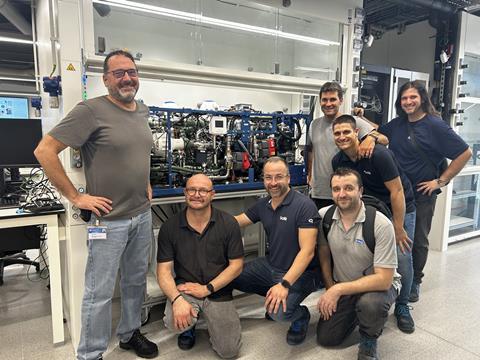Solé Advance announces the development of a proton exchange membrane (PEM) hydrogen fuel cell with a target output of 76 kW for integration into marine electric/hybrid propulsion solutions as well as onboard power generation.

The project strengthens the company’s innovation roadmap — following progress on HVO compatibility and new efficiency-focused ranges — and reinforces its vision of reliable, sustainable solutions for the nautical and commercial marine sectors. The initiative forms part of Solé’s R&D programme, currently in development and validation with a view to future production, and also considers applications in industrial environments beyond the marine domain.
Technology collaboration with Applus+ IDIADA, UPC and EKPO
The programme is being developed at Solé with technical collaboration from Applus+ IDIADA and the H2Lab at Universitat Politècnica de Catalunya · BarcelonaTech (UPC), combining applied engineering, test benches and an academic environment.
The fuel-cell stack is supplied by EKPO, a reference in hydrogen technology. This enables Solé to focus on the design of the Balance of Plant (BoP) — thermal and air management, humidification and purging, power supply, instrumentation and protections — with support from these collaborators, as well as on marine integration (control, cooling, safety and durability in saline environments).
The work has culminated in the assembly of a first integrated prototype, already validated at UPC’s laboratory during its initial test campaign.
One key advantage of the prototype is its compactness, which eases installation in the confined spaces typical of engine rooms without compromising service access.
“This programme is a natural step in our evolution towards next-generation onboard power systems and technological transition: integrating a 76 kW hydrogen fuel cell with safety, efficiency and maintenance criteria tailored to real operation on board, in both leisure and workboats. We are a company with strong engineering, design and innovation capability, and this project proves it.”
— Marieli Solé, CEO of Solé

“Initial tests at UPC’s laboratory have been encouraging. Our next step is to transfer those results to real operating conditions on a vessel, ensuring optimal cooling, consolidating a robust energy solution within an interconnected onboard energy ecosystem, developing control strategies for the most efficient power management possible, and paying special attention to corrosion resistance.”
— Víctor Miravet, Director of Engineering & Manufacturing at Solé
Technical scope and use cases
- Technology: PEM fuel cell adapted to marine operation (frequent starts, partial loads and vibration).
- Target output:76 kW as a base module, with options to scale via parallelisation.
- System compactness (stack + BoP): Optimised footprint for integration in engine rooms and existing hulls, maintaining service access.
- Intended integration: Electric/hybrid propulsion and auxiliary power generation.
- Dedicated team: A specialised Solé Engineering team leads integration and validation with partners.
METSTRADE: see you in Amsterdam
We will be at METSTRADE (RAI Amsterdam, 18–20 November 2025) with our regular solutions for leisure and professional boating. We’ll be happy to answer questions about the hydrogen programme and next steps. You’re welcome to visit us at stand 02.505.
About Solé
With more than a century of experience, Solé designs and manufactures inboard engines, marine generator sets and propulsion solutions for leisure and professional use.
In 2024, the company completed a rebranding that marked the start of a comprehensive transformation focused on innovation, sustainability and operational excellence, accelerating the development of new technologies, products and services for the future of navigation.
















